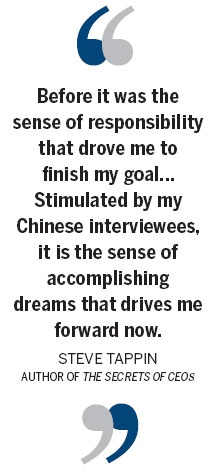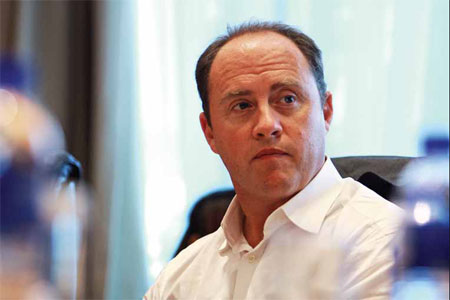Under the looking glass
Updated: 2012-08-31 10:46
By Hu Haiyan (China Daily)
|
|||||||||||
|
Steve Tappin uses his expertise to create innovative and confidant advisory services. Provided to China Daily |

British CEO coach says Chinese bosses must find the right balance between work and leisure
Steve Tappin has been looking at Chinese bosses under a microscope for more than four years, and he likes what he sees.
"What strikes me most is that, generally speaking, Chinese entrepreneurs are more enterprising and mission-driven than Western CEOs," says Tappin, a writer and a successful businessman himself.
If you think of companies as people, he says, a lot of foreign companies are more like middle-aged men, growing slowly but steadily.
"Chinese companies are like young people, growing very fast. Most of them are under the control of founders, who cherish the dream to make their companies everlasting."
In Beijing to promote his book Dream to Last, Tappin says that over the past three years he has traveled from London to China every month to interview about 100 Chinese company heads, including Yu Minhong, CEO of New Oriental Education and Technology Group, and Li Shufu, chairman of Zhejiang Geely Holding Group Co and Sweden's Volvo.
Tappin says the biggest challenge for Chinese bosses is to find the right balance between work and life.
"Western CEOs seek balance in their life and that's their philosophy. For instance, many people have weekends off. But for Chinese leaders, they focus on achieving their dreams.
"Because they are experts of their companies, they start to involve many day-to-day things in their working environments.
"Chinese companies are developing very fast but Chinese CEOs are under much pressure."
He says it is important for Chinese CEOs to be not bogged down by stress and to look after themselves first.
"It is important for the CEOs to have a good family life to have positive effects on their next generation," he says.
Tappin says the real challenge for Chinese CEOs does not come from the external factors, such as the market and client. "What matters is how to make their business modes sustainable and building up trust in their companies," he says.
He believes the more modern approach is to introduce the best talents into the company and trust them, and to share the dreams and responsibilities with the employees to make the company develop in a sustainable way.
In his new book, Tappin puts forward many suggestions for Chinese CEOs to build trust in their companies and establish some networks to expand their international businesses.
"For Chinese companies which want to go global, it is very essential for them to think about effective and suitable approaches, such as finding a global partner or acquisition," he says.
Tappin, 46, has always been interested in what makes CEOs tick.
It is not the first time he has revealed the management secrets of CEOs. In 2008, he launched a book entitled The Secrets of CEOs, which covers the management skills of about 200 CEOs across the world. But just five Chinese interviewees were included in that book.
"I got to know that China is very different from Western countries through interviewing some Chinese CEOs for my previous book. Since then, I had the plan to introduce the real Chinese businesses to the outside world," he says.
The new book, in which he collaborated with Zhou Baolin, chief executive officer of Bond Education, a Shenzhen-based private education institution for middle and primary school students, will be launched in October.
Tappin also interviewed about 20 members of the China Entrepreneur Club, including its chairman, Liu Chuanzhi, founder of China's largest PC maker Lenovo.
Cheng Hong, CEO of the club, says Tappin is like an ambassador who introduces Chinese entrepreneurs to the outside world.
"What differentiates Tappin from other foreign scholars is that he is more willing to understand the thoughts of his interviewees, instead of having his own mindset before interviewing," she says.
Tappin's new book offers insights by a foreign expert on Chinese CEOs' views of the opportunities and challenges in the domestic and international markets, Cheng says.
Tappin is also amazed by the diverse interests of Chinese chief executives.
"Some like climbing mountains, while others prefer shadow boxing, and many of these traits can be learnt by the Western CEOs," he says.
He also says that the enthusiasm of Chinese CEOs inspires his own dreams.
"Before it was the sense of responsibility that drove me to finish my goal, to find better ways to manage the companies. Stimulated by my Chinese interviewees, it is the sense of accomplishing dreams that drives me forward now," he says.
Tappin started his career at the UK chemicals conglomerate ICI serving as a certified accountant when he was 21 years old.
After earning an MBA degree at Cranfield School of Management in the UK and the University of Washington in 1993, he worked as a management consultant, first for international business adviser KPMG and then for PA Consulting Group.
He found there were too many procedures and too much bureaucracy in some big companies, which hindered their development.
He then nurtured the idea of finding better ways to lead big companies. "I didn't know what the effective measures were, but I would find them."
After meeting different CEOs, he created his own company Edengene in 2000 to help big corporations build new businesses.
One of his bigger successes was helping British Telecommunications set up its subsidiary, BT Broadband. Three years later, he sold one-third of the shares in the business for an undisclosed sum, making him "financially independent" for life, which led him to work on his ideas to analyze CEO development.
In 2005, he established a consulting firm, Leaders Reloaded, to provide a coaching service for CEOs.
His skills in this field were recognized by the international recruitment consultant Heidrick & Struggles, which made him its global CEO practice managing partner.
He left to work on his book The Secrets of CEOs in 2008 and has since set up Xinfu, a London-based CEO confidant. His clients include business leaders from the UK, China and India.
After the book's launch, he plans to introduce Chinese companies to Chinese readers from the angle of a foreign expert.
"I also plan to introduce more Chinese companies to foreign readers, to make the outside world know more about China," Tappin says.
Andrew Moody contributed to the story.
huhaiyan@chinadaily.com.cn
(China Daily 08/31/2012 page30)
Today's Top News
Rescuers race against time for quake victims
Telecom workers restore links
Coal mine blast kills 18 in Jilin
Intl scholarship puts China on the map
More bird flu patients discharged
Gold loses sheen, but still a safe bet
US 'turns blind eye to human rights'
Telecom workers restore links
Hot Topics
Lunar probe , China growth forecasts, Emission rules get tougher, China seen through 'colored lens', International board,
Editor's Picks

|

|

|

|

|

|






